-
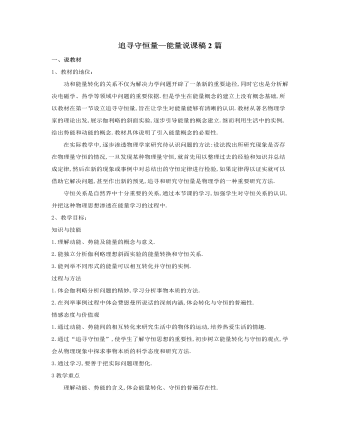
人教版新课标高中物理必修2追寻守恒量—能量说课稿2篇
[小结]师:下面同学们概括总结本节所学的内容。请一个同学到黑板上总结,其他同学在笔记本上总结,然后请同学评价黑板上的小结内容。 (学生认真总结概括本节内容,并把自己这节课的体会写下来、比较黑板上的小结和自己的小结,看谁的更好,好在什么地方。) 生:本节课我们通过伽利略理想斜面实验,分析得出了能量以及动能和势能的概念,从能量的相互转化角度认识到,在动能和势能的相互转化过程中,能的总量保持不变,即能量是守恒的。通过这节课的学习,使我们建立起了守恒的思想。 点评:总结课堂内容,培养学生概括总结能力。 教师要放开,让学生自己总结所学内容,允许内容的顺序不同,从而构建他们自己的知识框架。[布置作业]课后讨论 P3“问题与练习”中的问题。[课外训练]以竖直上抛的小球为例说明小球的势能和动能的转化情况。在这个例子中是否存在着能的总量保持不变?
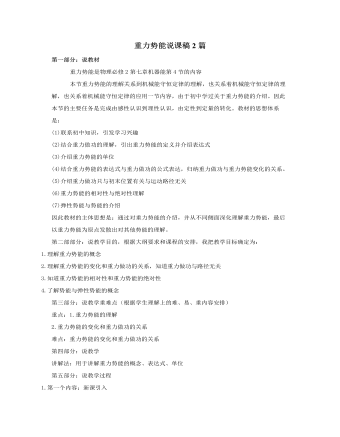
人教版新课标高中物理必修2重力势能说课稿2篇
(四)、弹性势能(据课时情况,可以让学生自学)生活中还有一些物体既没有运动也没有很大的高度却同样“储存”着能量,哪怕它只是孩童手里的玩具(图片:弹弓)。张紧的弓一撒手就会对箭支做功改变它的动能,松弛的弓有这样的本领吗?同样是弓前者具有能量而后者没有,那么什么情况下物体才具有这种能量呢?张紧的弓在恢复原状的过程会对外做功,但是拉断的弓还能有做功的本领吗?1.定义:物体由于发生弹性形变而具有的能量叫做弹性势能。2.弹性势能的大小与哪些因素有关呢?3、势能由相互作用的物体的相对位置决定的能量。重力势能:由地球和物体间相对位置决定。弹性势能:由发生形变的各部分的相对位置决定。(五).反馈练习1. 物体在运动过程中,克服重力做功50J, 则( )A.重力做功为50JB.物体的重力势能一定增加50JC.物体的重力势能一定减少50JD.重力做功为-50J
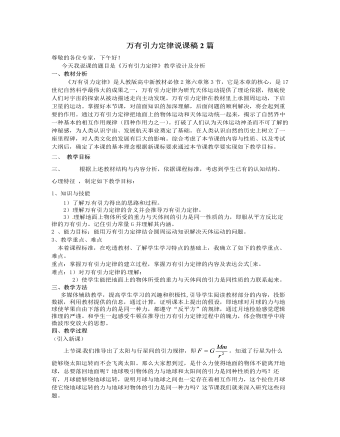
人教版新课标高中物理必修2万有引力定律说课稿2篇
学生中存在这样的问题:既然宇宙间的一切物体都是相互吸引的,那么为什么没有吸引到一起?为了解决这个问题,安排了例题2例2、两物体质量都是1kg,相距1m,它们间的万有引力是多少?通过本题,让学生认识到一般物体间的引力极小,不用考虑。那么,质量很大的天体为什么没被吸引到一块?从而引出下节课题。4.课堂小结:本节课,从天体运动出发,通过推理证明,形成理性认识,再结合例题习题使学生的理性认识再反馈到具体事实。形成实践-理论-实践的认知循环,顺应了认知规律.。本共设计了很多问,能让学生想的尽量让学生想、能学生说的尽量让学生说、能让学生做的尽量让学生做,全面发展学生的各方面能力。再通过作业和探究性课题使学生的思维活动在时空上得以延续。5.布置作业:布置作业时刻意安排引入:万有引力、重力、向心力、三者的联系,通过引导学生对比结果,从中发现问题:万有引力与重力向心力的关系与区别,为下节知识的难点突破作好了铺垫。
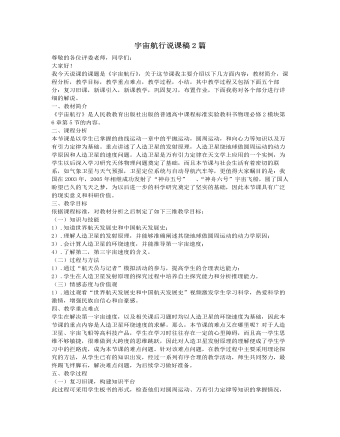
人教版新课标高中物理必修2宇宙航行说课稿2篇
了解了第一宇宙速度及其意义之后,继续提出问题,让学生思考:如果卫星的发射速度大于第一宇宙速度7.9km/s ,会出现什么情况呢?先让学生们大胆猜想,然后再向学生们介绍 卫星发射速度大于第一宇宙速度后的几种可能情况,引出第二宇宙速度和第三宇宙速度,让学生对第二、第三宇宙速度及其意义做定性了解。并通过演示Flash课件,帮助学生理解、加深学生印象。在学生对人造卫星的原理及发射卫星的速度条件有了初步了解后,接下来引导学生对卫星的运动规律作进一步的探索。实际上卫星并不是沿地表水平发射的,而是用火箭多次加速送到一定的高度的轨道后,再沿以地心为圆心的圆周的切线运行的。让学生继续深入思考:卫星在不同高度绕地球运行时的速度怎么求呢?将卫星送入低轨道和高轨道所需的速度都一样么?如果把不同轨道上的卫星绕地球的运动都看成是匀速圆周运动,引导学生利用已学的万有引力和圆周运动的相关知识,探究卫星绕地球的运行规律。
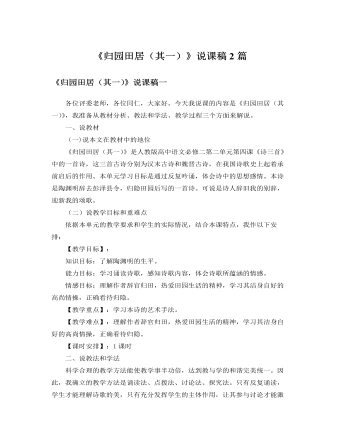
人教版高中语文必修2《归园田居(其一)》说课稿2篇
我还运用多媒体投影幻灯片给学生设置两组相互对照的选项,让同学们根据幻灯片选择:你赞同每组中那一种价值取向?一组是功名、进取、高官、厚禄与自然、隐逸、本性、自由。另一组是科学、发展、强大、集中与诗意、和谐、柔弱、个体。经过合作探究,讨论解答,学生结合陶渊明的归隐对第一组讨论探究的应该比较容易,而对第二组的理解探究会出现一定的难度,教师可以就学生的情感价值观方面适当的给予点拨引导:幻灯片上面的第二组文字通过对比,给我们提供了两种价值取向,你是要通过科学、发展、强大和集中来实现遨游太空等童话,那就势必会令我们放弃了诗意的童话,只关注工业的发展,城市面积的扩大,乡村田园必将减少 。你还是要维护生态平衡,保护一切的多样性呢?我认为诗意永远要领导科学,梅罗和陶渊明就共同表达了八个字——诗意、和谐、柔弱和个体。你的本性在田园,当我们身心疲惫时,我们都需要一个心灵的家园,所以我希望大家无论做何选择都能够守住我们那片宁静、祥和的心灵家园。
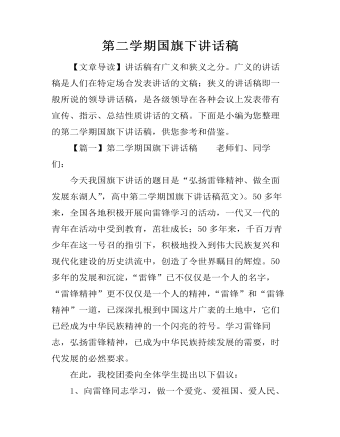
第二学期国旗下讲话稿
【文章导读】讲话稿有广义和狭义之分。广义的讲话稿是人们在特定场合发表讲话的文稿;狭义的讲话稿即一般所说的领导讲话稿,是各级领导在各种会议上发表带有宣传、指示、总结性质讲话的文稿。下面是小编为您整理的第二学期国旗下讲话稿,供您参考和借鉴。【篇一】第二学期国旗下讲话稿 老师们、同学们:今天我国旗下讲话的题目是“弘扬雷锋精神、做全面发展东湖人”,高中第二学期国旗下讲话稿范文)。50多年来,全国各地积极开展向雷锋学习的活动,一代又一代的青年在活动中受到教育,茁壮成长;50多年来,千百万青少年在这一号召的指引下,积极地投入到伟大民族复兴和现代化建设的历史洪流中,创造了令世界瞩目的辉煌。50多年的发展和沉淀,“雷锋”已不仅仅是一个人的名字,“雷锋精神”更不仅仅是一个人的精神,“雷锋”和“雷锋精神”一道,已深深扎根到中国这片广袤的土地中,它们已经成为中华民族精神的一个闪亮的符号。学习雷锋同志,弘扬雷锋精神,已成为中华民族持续发展的需要,时代发展的必然要求。
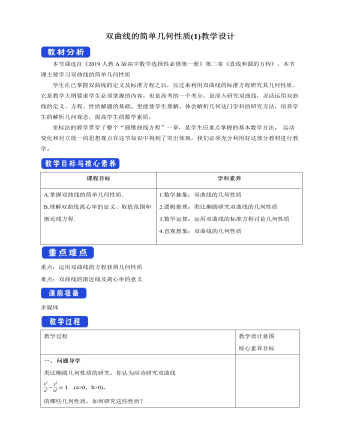
双曲线的简单几何性质(1)教学设计人教A版高中数学选择性必修第一册
问题导学类比椭圆几何性质的研究,你认为应该研究双曲线x^2/a^2 -y^2/b^2 =1 (a>0,b>0),的哪些几何性质,如何研究这些性质1、范围利用双曲线的方程求出它的范围,由方程x^2/a^2 -y^2/b^2 =1可得x^2/a^2 =1+y^2/b^2 ≥1 于是,双曲线上点的坐标( x , y )都适合不等式,x^2/a^2 ≥1,y∈R所以x≥a 或x≤-a; y∈R2、对称性 x^2/a^2 -y^2/b^2 =1 (a>0,b>0),关于x轴、y轴和原点都是对称。x轴、y轴是双曲线的对称轴,原点是对称中心,又叫做双曲线的中心。3、顶点(1)双曲线与对称轴的交点,叫做双曲线的顶点 .顶点是A_1 (-a,0)、A_2 (a,0),只有两个。(2)如图,线段A_1 A_2 叫做双曲线的实轴,它的长为2a,a叫做实半轴长;线段B_1 B_2 叫做双曲线的虚轴,它的长为2b,b叫做双曲线的虚半轴长。(3)实轴与虚轴等长的双曲线叫等轴双曲线4、渐近线(1)双曲线x^2/a^2 -y^2/b^2 =1 (a>0,b>0),的渐近线方程为:y=±b/a x(2)利用渐近线可以较准确的画出双曲线的草图

双曲线的简单几何性质(2)教学设计人教A版高中数学选择性必修第一册
二、典例解析例4.如图,双曲线型冷却塔的外形,是双曲线的一部分,已知塔的总高度为137.5m,塔顶直径为90m,塔的最小直径(喉部直径)为60m,喉部标高112.5m,试建立适当的坐标系,求出此双曲线的标准方程(精确到1m)解:设双曲线的标准方程为 ,如图所示:为喉部直径,故 ,故双曲线方程为 .而 的横坐标为塔顶直径的一半即 ,其纵坐标为塔的总高度与喉部标高的差即 ,故 ,故 ,所以 ,故双曲线方程为 .例5.已知点 到定点 的距离和它到定直线l: 的距离的比是 ,则点 的轨迹方程为?解:设点 ,由题知, ,即 .整理得: .请你将例5与椭圆一节中的例6比较,你有什么发现?例6、 过双曲线 的右焦点F2,倾斜角为30度的直线交双曲线于A,B两点,求|AB|.分析:求弦长问题有两种方法:法一:如果交点坐标易求,可直接用两点间距离公式代入求弦长;法二:但有时为了简化计算,常设而不求,运用韦达定理来处理.解:由双曲线的方程得,两焦点分别为F1(-3,0),F2(3,0).因为直线AB的倾斜角是30°,且直线经过右焦点F2,所以,直线AB的方程为
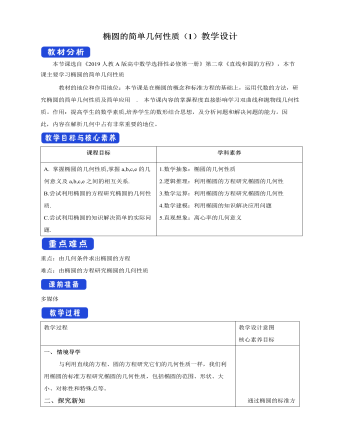
椭圆的简单几何性质(1)教学设计人教A版高中数学选择性必修第一册
1.判断 (1)椭圆x^2/a^2 +y^2/b^2 =1(a>b>0)的长轴长是a. ( )(2)若椭圆的对称轴为坐标轴,长轴长与短轴长分别为10,8,则椭圆的方程为x^2/25+y^2/16=1. ( )(3)设F为椭圆x^2/a^2 +y^2/b^2 =1(a>b>0)的一个焦点,M为其上任一点,则|MF|的最大值为a+c(c为椭圆的半焦距). ( )答案:(1)× (2)× (3)√ 2.已知椭圆C:x^2/a^2 +y^2/4=1的一个焦点为(2,0),则C的离心率为( )A.1/3 B.1/2 C.√2/2 D.(2√2)/3解析:∵a2=4+22=8,∴a=2√2.∴e=c/a=2/(2√2)=√2/2.故选C.答案:C 三、典例解析例1已知椭圆C1:x^2/100+y^2/64=1,设椭圆C2与椭圆C1的长轴长、短轴长分别相等,且椭圆C2的焦点在y轴上.(1)求椭圆C1的半长轴长、半短轴长、焦点坐标及离心率;(2)写出椭圆C2的方程,并研究其性质.解:(1)由椭圆C1:x^2/100+y^2/64=1,可得其半长轴长为10,半短轴长为8,焦点坐标为(6,0),(-6,0),离心率e=3/5.(2)椭圆C2:y^2/100+x^2/64=1.性质如下:①范围:-8≤x≤8且-10≤y≤10;②对称性:关于x轴、y轴、原点对称;③顶点:长轴端点(0,10),(0,-10),短轴端点(-8,0),(8,0);④焦点:(0,6),(0,-6);⑤离心率:e=3/5.
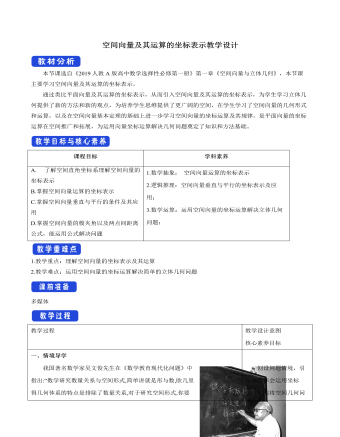
空间向量及其运算的坐标表示教学设计人教A版高中数学选择性必修第一册
一、情境导学我国著名数学家吴文俊先生在《数学教育现代化问题》中指出:“数学研究数量关系与空间形式,简单讲就是形与数,欧几里得几何体系的特点是排除了数量关系,对于研究空间形式,你要真正的‘腾飞’,不通过数量关系,我想不出有什么好的办法…….”吴文俊先生明确地指出中学几何的“腾飞”是“数量化”,也就是坐标系的引入,使得几何问题“代数化”,为了使得空间几何“代数化”,我们引入了坐标及其运算.二、探究新知一、空间直角坐标系与坐标表示1.空间直角坐标系在空间选定一点O和一个单位正交基底{i,j,k},以点O为原点,分别以i,j,k的方向为正方向、以它们的长为单位长度建立三条数轴:x轴、y轴、z轴,它们都叫做坐标轴.这时我们就建立了一个空间直角坐标系Oxyz,O叫做原点,i,j,k都叫做坐标向量,通过每两个坐标轴的平面叫做坐标平面,分别称为Oxy平面,Oyz平面,Ozx平面.
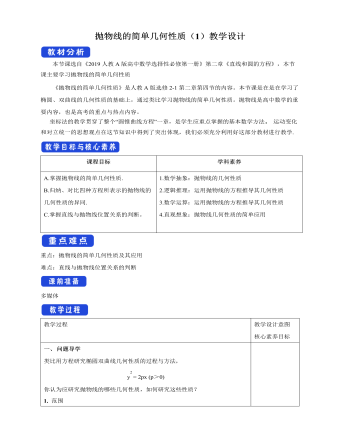
抛物线的简单几何性质(1)教学设计人教A版高中数学选择性必修第一册
问题导学类比用方程研究椭圆双曲线几何性质的过程与方法,y2 = 2px (p>0)你认为应研究抛物线的哪些几何性质,如何研究这些性质?1. 范围抛物线 y2 = 2px (p>0) 在 y 轴的右侧,开口向右,这条抛物线上的任意一点M 的坐标 (x, y) 的横坐标满足不等式 x ≥ 0;当x 的值增大时,|y| 也增大,这说明抛物线向右上方和右下方无限延伸.抛物线是无界曲线.2. 对称性观察图象,不难发现,抛物线 y2 = 2px (p>0)关于 x 轴对称,我们把抛物线的对称轴叫做抛物线的轴.抛物线只有一条对称轴. 3. 顶点抛物线和它轴的交点叫做抛物线的顶点.抛物线的顶点坐标是坐标原点 (0, 0) .4. 离心率抛物线上的点M 到焦点的距离和它到准线的距离的比,叫做抛物线的离心率. 用 e 表示,e = 1.探究如果抛物线的标准方程是〖 y〗^2=-2px(p>0), ②〖 x〗^2=2py(p>0), ③〖 x〗^2=-2py(p>0), ④
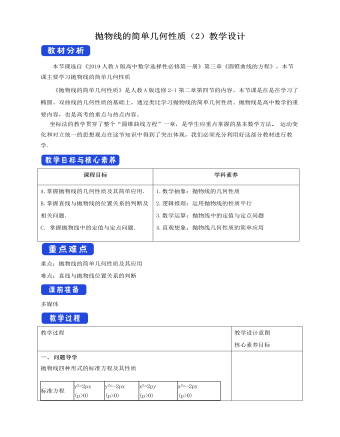
抛物线的简单几何性质(2)教学设计人教A版高中数学选择性必修第一册
二、直线与抛物线的位置关系设直线l:y=kx+m,抛物线:y2=2px(p>0),将直线方程与抛物线方程联立整理成关于x的方程k2x2+2(km-p)x+m2=0.(1)若k≠0,当Δ>0时,直线与抛物线相交,有两个交点;当Δ=0时,直线与抛物线相切,有一个切点;当Δ<0时,直线与抛物线相离,没有公共点.(2)若k=0,直线与抛物线有一个交点,此时直线平行于抛物线的对称轴或与对称轴重合.因此直线与抛物线有一个公共点是直线与抛物线相切的必要不充分条件.二、典例解析例5.过抛物线焦点F的直线交抛物线于A、B两点,通过点A和抛物线顶点的直线交抛物线的准线于点D,求证:直线DB平行于抛物线的对称轴.【分析】设抛物线的标准方程为:y2=2px(p>0).设A(x1,y1),B(x2,y2).直线OA的方程为: = = ,可得yD= .设直线AB的方程为:my=x﹣ ,与抛物线的方程联立化为y2﹣2pm﹣p2=0,
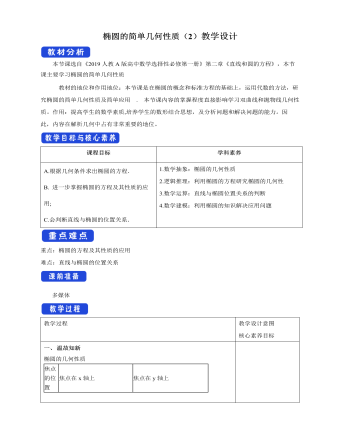
椭圆的简单几何性质(2)教学设计人教A版高中数学选择性必修第一册
二、典例解析例5. 如图,一种电影放映灯的反射镜面是旋转椭圆面(椭圆绕其对称轴旋转一周形成的曲面)的一部分。过对称轴的截口 ABC是椭圆的一部分,灯丝位于椭圆的一个焦点F_1上,片门位另一个焦点F_2上,由椭圆一个焦点F_1 发出的光线,经过旋转椭圆面反射后集中到另一个椭圆焦点F_2,已知 〖BC⊥F_1 F〗_2,|F_1 B|=2.8cm, |F_1 F_2 |=4.5cm,试建立适当的平面直角坐标系,求截口ABC所在的椭圆方程(精确到0.1cm)典例解析解:建立如图所示的平面直角坐标系,设所求椭圆方程为x^2/a^2 +y^2/b^2 =1 (a>b>0) 在Rt ΔBF_1 F_2中,|F_2 B|= √(|F_1 B|^2+|F_1 F_2 |^2 )=√(〖2.8〗^2 〖+4.5〗^2 ) 有椭圆的性质 , |F_1 B|+|F_2 B|=2 a, 所以a=1/2(|F_1 B|+|F_2 B|)=1/2(2.8+√(〖2.8〗^2 〖+4.5〗^2 )) ≈4.1b= √(a^2 〖-c〗^2 ) ≈3.4所以所求椭圆方程为x^2/〖4.1〗^2 +y^2/〖3.4〗^2 =1 利用椭圆的几何性质求标准方程的思路1.利用椭圆的几何性质求椭圆的标准方程时,通常采用待定系数法,其步骤是:(1)确定焦点位置;(2)设出相应椭圆的标准方程(对于焦点位置不确定的椭圆可能有两种标准方程);(3)根据已知条件构造关于参数的关系式,利用方程(组)求参数,列方程(组)时常用的关系式有b2=a2-c2等.
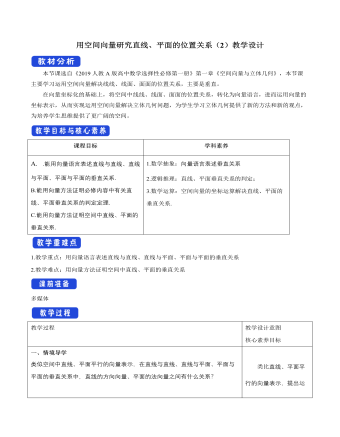
用空间向量研究直线、平面的位置关系(2)教学设计人教A版高中数学选择性必修第一册
跟踪训练1在正方体ABCD-A1B1C1D1中,E为AC的中点.求证:(1)BD1⊥AC;(2)BD1⊥EB1.(2)∵(BD_1 ) ?=(-1,-1,1),(EB_1 ) ?=(1/2 "," 1/2 "," 1),∴(BD_1 ) ?·(EB_1 ) ?=(-1)×1/2+(-1)×1/2+1×1=0,∴(BD_1 ) ?⊥(EB_1 ) ?,∴BD1⊥EB1.证明:以D为原点,DA,DC,DD1所在直线分别为x轴、y轴、z轴,建立如图所示的空间直角坐标系.设正方体的棱长为1,则B(1,1,0),D1(0,0,1),A(1,0,0),C(0,1,0),E(1/2 "," 1/2 "," 0),B1(1,1,1).(1)∵(BD_1 ) ?=(-1,-1,1),(AC) ?=(-1,1,0),∴(BD_1 ) ?·(AC) ?=(-1)×(-1)+(-1)×1+1×0=0.∴(BD_1 ) ?⊥(AC) ?,∴BD1⊥AC.例2在棱长为1的正方体ABCD-A1B1C1D1中,E,F,M分别为棱AB,BC,B1B的中点.求证:D1M⊥平面EFB1.思路分析一种思路是不建系,利用基向量法证明(D_1 M) ?与平面EFB1内的两个不共线向量都垂直,从而根据线面垂直的判定定理证得结论;另一种思路是建立空间直角坐标系,通过坐标运算证明(D_1 M) ?与平面EFB1内的两个不共线向量都垂直;还可以在建系的前提下,求得平面EFB1的法向量,然后说明(D_1 M) ?与法向量共线,从而证得结论.证明:(方法1)因为E,F,M分别为棱AB,BC,B1B的中点,所以(D_1 M) ?=(D_1 B_1 ) ?+(B_1 M) ?=(DA) ?+(DC) ?+1/2 (B_1 B) ?,而(B_1 E) ?=(B_1 B) ?+(BE) ?=(B_1 B) ?-1/2 (DC) ?,于是(D_1 M) ?·(B_1 E) ?=((DA) ?+(DC) ?+1/2 (B_1 B) ?)·((B_1 B) ?-1/2 (DC) ?)=0-0+0-1/2+1/2-1/4×0=0,因此(D_1 M) ?⊥(B_1 E) ?.同理(D_1 M) ?⊥(B_1 F) ?,又因为(B_1 E) ?,(B_1 F) ?不共线,因此D1M⊥平面EFB1.
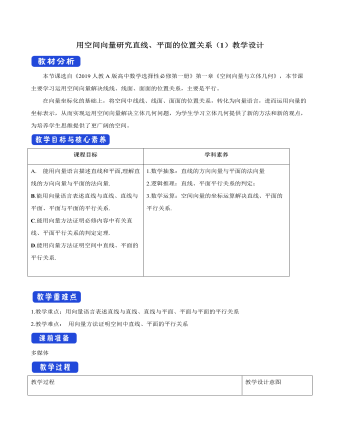
用空间向量研究直线、平面的位置关系(1)教学设计人教A版高中数学选择性必修第一册
二、探究新知一、空间中点、直线和平面的向量表示1.点的位置向量在空间中,我们取一定点O作为基点,那么空间中任意一点P就可以用向量(OP) ?来表示.我们把向量(OP) ?称为点P的位置向量.如图.2.空间直线的向量表示式如图①,a是直线l的方向向量,在直线l上取(AB) ?=a,设P是直线l上的任意一点,则点P在直线l上的充要条件是存在实数t,使得(AP) ?=ta,即(AP) ?=t(AB) ?.如图②,取定空间中的任意一点O,可以得到点P在直线l上的充要条件是存在实数t,使(OP) ?=(OA) ?+ta, ①或(OP) ?=(OA) ?+t(AB) ?. ②①式和②式都称为空间直线的向量表示式.由此可知,空间任意直线由直线上一点及直线的方向向量唯一确定.1.下列说法中正确的是( )A.直线的方向向量是唯一的B.与一个平面的法向量共线的非零向量都是该平面的法向量C.直线的方向向量有两个D.平面的法向量是唯一的答案:B 解析:由平面法向量的定义可知,B项正确.
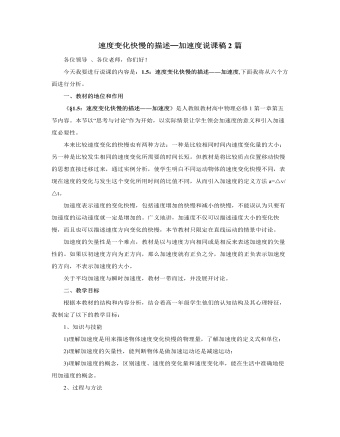
人教版新课标高中物理必修1速度变化快慢的描述─加速度说课稿2篇
本来比较速度变化的快慢也有两种方法:一种是比较相同时间内速度变化量的大小;另一种是比较发生相同的速度变化所需要的时间长短。但教材是将比较质点位置移动快慢的思想直接迁移过来,通过实例分析,使学生明白不同运动物体的速度变化快慢不同,表现在速度的变化与发生这个变化所用时间的比值不同,从而引入加速度的定义方法a=△v/△t。加速度表示速度的变化快慢,包括速度增加的快慢和减小的快慢,不能误认为只要有加速度的运动速度就一定是增加的。广义地讲,加速度不仅可以描述速度大小的变化快慢,而且也可以描述速度方向变化的快慢,本节教材只限定在直线运动的情景中讨论。加速度的矢量性是一个难点,教材是以与速度方向相同或是相反来表述加速度的矢量性的。如果以初速度方向为正方向,那么加速度就有正负之分,加速度的正负表示加速度的方向,不表示加速度的大小。
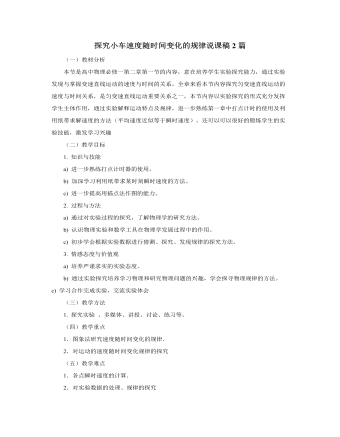
人教版新课标高中物理必修1探究小车速度随时间变化的规律说课稿2篇
(三)合作交流能力提升教师:刚才我们通过实验了解了小车的速度是怎样随时间变化的,但实验中有一定的误差,请同学们讨论并说出可能存在哪些误差,造成误差的原因是什么?(每个实验小组的同学之间进行热烈的讨论)学生:测量出现误差。因为点间距离太小,测量长度时容易产生误差。教师:如何减小这个误差呢?学生:如果测量较长的距离,误差应该小一些。教师:应该采取什么办法?学生:应该取几个点之间的距离作为一个测量长度。教师:好,这就是常用的取“计数点”的方法。我们应该在纸带上每隔几个计时点取作一个计数点,进行编号。分别标为:0、1、2、3……,测各计数点到“0”的距离。以减小测量误差。教师:还有补充吗?学生1:我在坐标系中描点画的图象只集中在坐标原定附近,两条图象没有明显的分开。学生2:描出的几个点不严格的分布在一条直线上,还能画直线吗?
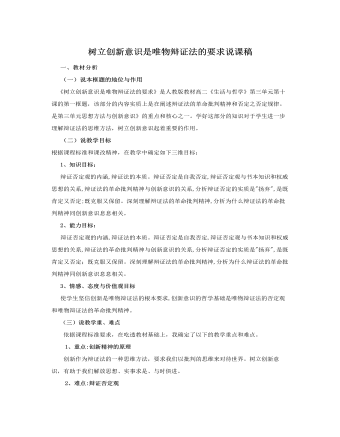
人教版高中政治必修4树立创新意识是唯物辩证法的要求说课稿(二)
一、教材分析(一)说本框题的地位与作用《树立创新意识是唯物辩证法的要求》是人教版教材高二《生活与哲学》第三单元第十课的第一框题,该部分的内容实质上是在阐述辩证法的革命批判精神和否定之否定规律。是第三单元思想方法与创新意识》的重点和核心之一。学好这部分的知识对于学生进一步理解辩证法的思维方法,树立创新意识起着重要的作用。(二)说教学目标根据课程标准和课改精神,在教学中确定如下三维目标:1、知识目标:辩证否定观的内涵,辩证法的本质。辩证否定是自我否定,辩证否定观与书本知识和权威思想的关系,辩证法的革命批判精神与创新意识的关系,分析辩证否定的实质是"扬弃",是既肯定又否定;既克服又保留。深刻理解辩证法的革命批判精神,分析为什么辩证法的革命批判精神同创新意识息息相关。
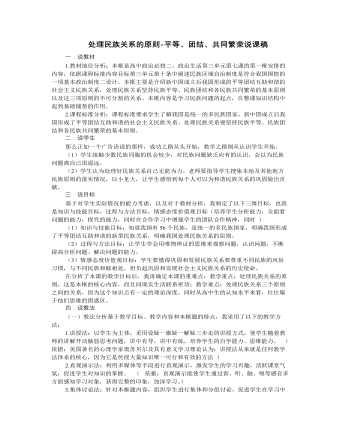
人教版高中政治必修2处理民族关系的原则-平等、团结、共同繁荣说课稿
环节四 情感升华,感悟生活播放《爱我中华》,感受祖国的伟大,民族的团结。设计意图:使学生感受伟大的中华民族的精神,内心产生共鸣,抒发强烈的爱国热情。教师带领学生一起合唱,用歌声结束本堂课内容,能再次唤起学生的爱国情感,使学生认识到:维护国家统一和民族团结是每个公民的义务。环节五 课堂小结 巩固知识本节课我采用线索性的板书,整个知识结构一目了然,为了充分发挥学生在课堂的主体地位,我将课堂小结交由学生完成,请学生根据课堂学习的内容,结合我的板书设计来进行小结,以此来帮助教师在第一时间掌握学生学习信息的反馈,同时培养学生归纳分析能力、概括能力。本节课,我根据建构主义理论,强调学生是学习的中心,学生是知识意义的主动建构者,是信息加工的主体,要强调学生在课堂中的参与性、以及探究性,不仅让他们懂得知识,更让他们相信知识,并且将知识融入到实践当中去,最终达到知、情、意、行的统一。
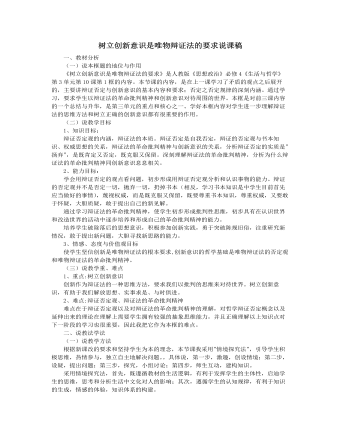
人教版高中政治必修4树立创新意识是唯物辩证法的要求说课稿(一)
(二)说学法指导把“学习的主动权还给学生”,倡导“自主、合作、探究”的学习方式,因而,我在教学过程中特别重视创造学生自主参与,合作交流的机会,充分利用学生已获得的生活体验,通过相关现象的再现,激发学生主动参与,积极思考,分析现象背后的哲学理论依据,帮助学生树立批判精神和创新意识,从而增强教学效果,让学生在自己思维的活跃中领会本节课的重点难点。(三)说教学手段:我运用多媒体辅助教学,展示富有感染力的各种现象和场景,营造一个形象生动的课堂气氛。三、说教学过程教学过程坚持"情境探究法",分为"导入新课——推进新课——走进生活"三个层次,环环相扣,逐步推进,帮助学生完成由感性认识到理性认识的飞跃。下面我重点简述一下对教学过程的设计。

